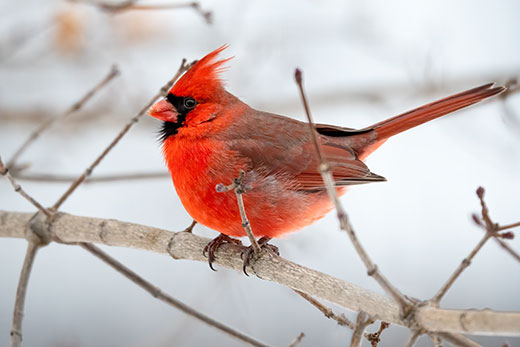
The cardinal is one of many birds that need a little help finding food during the winter months.
Mild winter weather? Keep feeding backyard birds
K-State horticulture expert says food is still a scare resource for your feathered friends
Jan. 21, 2021
MANHATTAN, Kan. – Don’t be fooled by the spate of warm weather around many parts of Kansas recently. It really is winter in the Sunflower State, right?
Many bird watchers may be thinking birds have survived the most bitter parts of the season, but Kansas State University horticulture expert Ward Upham urges backyard enthusiasts to keep helping their feathered friends get through the next several weeks.
“Severe winter weather is not only hard on people, but can be a life and death struggle for birds,” he said. “Though birds require water and shelter, food is often the resource most lacking during cold weather.”
Upham noted that many bird food mixes are available depending on what species folks are most interested in attracting to their backyard.
“However, there is one seed that has more universal appeal than any other: black oil sunflower,” Upham said. “If you are new to the bird-feeding game, make sure there is a high percentage of this seed in your mix.”
White proso millet is also preferred by many birds, especially dark-eyed juncos, sparrows and the red-winged blackbird.
By species, here are the grains that many Kansas birds prefer:
- Cardinal, evening grosbeak and most finch species – all types of sunflower seeds.
- Rufous-sided towhee – white proso millet.
- Dark-eyed junco – white and red proso millet, canary seed, fine cracked corn.
- Many sparrow species – white and red proso millet.
- Bluejay – peanut kernels and all types of sunflower seeds.
- Chickadee and tufted titmouse – peanut kernels, black oil and black-striped sunflower seeds.
- Red-breasted nuthatch – black oil and black-striped sunflower seeds.
- Brown thrasher – hulled and black-striped sunflower seeds.
- Red-winged blackbird – white and red proso millet plus German (golden) millet.
- Mourning dove – black oil sunflower seeds, white and red proso plus German (golden) millet.
“As you become more interested in bird feeding, you may want to use more than one feeder to attract specific species of birds,” Upham said.
He added that extended cold periods also can make water unavailable. Consider providing a heated birdbath, if available.
More information on backyard birding is available online in publications produced by K-State Research and Extension Geary County extension agent Chuck Otte.
Upham and his colleagues in K-State’s Department of Horticulture and Natural Resources produce a weekly Horticulture Newsletter with tips for maintaining home landscapes. The newsletter is available to view online or can be delivered by email each week.
Interested persons can also send their garden- and yard-related questions to Upham at wupham@ksu.edu, or contact your local K-State Research and Extension office.

